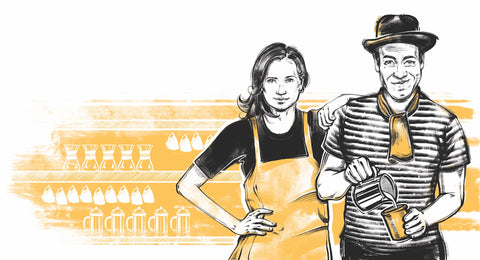Talk to anyone in coffee about what drew them to, or kept them in, the coffee business, and they’ll all give you one big reason: the people. The coffee world’s tight-knit global community of geeky, gregarious, and pleasure-minded people tends to create an infectious enthusiasm, and as specialty coffee has grown in popularity, it’s made a coffee lover’s world feel all the more welcoming. So, in an industry full of magnetic personalities and creative minds who stimulate one another, why is it so hard to keep great people in coffee-serving jobs?
To make barista jobs sustainable and meaningful, we need to add value to them from the very beginning.
For most of us, this question starts at the café’s entry level, specifically the role of the barista. (Where you live, the entry level may be bar-back or dishwasher, but in many more cities, baristas do it all.) Baristas — the front-line soldiers, the ambassadors, and the show-persons of the craft of brewing — are the workers who give many people their first meaningful experiences with great coffee. And as the number of good, even terrific, coffee shops grows by leaps and bounds around the globe, many people higher up the chain thrill to the sounds of more cash registers (or Square/iZettle swipes) ringing in profits. But for an industry to sustain growth, the fact that the largest part of its workforce — the bottom of the retail pyramid — doesn’t have a sustainable job, requires scrutiny.
Adding Value to the Barista Job
Looking at the traditional career paths in most companies that operate cafés and roast coffee, we have to admit ‘the funnel narrows very sharply’ — as Square Mile Coffee Roasters’ James Hoffmann put it so well in a blog post entitled Coffee is a Dead-End Job, springing out of his Coffee Jobs podcast. When we restrict our imagined ladder out from behind the bar to include only a small range of jobs within these same coffee companies, indeed the path up is limited. You can work as a barista until you’re good enough to manage, to train others, to be the company educator, to perhaps become a quality control person or roaster, to one day living the fantasied life of travelling the world and buying green coffee — perhaps a bit more romanticised than reality merits. It’s worth noting that green buying seems to be a particular aspiration that few can achieve in an industry which has held up some very compelling role models.

Who hasn’t envied the travels of Geoff Watts, or Aleco Chigounis, or Tim Wendelboe jet-setting down to tinker on his own Colombian farm? The idea that this is a position at the top — short of taking over the company — is understandable. But roles like this are not just limited, they’re simply not for everyone. Some people want to be home with their families more of the year, or don’t have the travel bug, or their Spanish is humiliating. Our industry says these people can have the desk jobs (or standing desk jobs), becoming owners and operators and overseeing all the rest — which would be a lovely aspiration, too, if starting out in a company as barista meant you were furnished with a little business acumen.
‘There’s no job in which having great customer service skills isn’t useful.’
Which takes us to the Hoffmann argument: to make barista jobs sustainable and meaningful, we need to add value to them from the very beginning in ways that exceed teaching the basics of dosing and extraction. ‘I think if we were smart, we’d start looking at coffee shops as a place to develop a bunch of skills, not just the minutiae of pulling espresso,’ says Hoffmann. ‘Basic financial modelling, or how to read a profit and loss statement, or the impact of staff costing on a business, or how to genuinely problem-solve,’ he rattles off. ‘It should be more “come and work for me at this coffee shop, you will learn not just the detail of how to make great coffee, you will not just learn how to pour nice pictures on top of milk, you will learn other stuff that is useful.”’
Of course, we first have to look past our own egos and acknowledge that not everyone may want a lifelong career in coffee. And that’s not a bad thing. If the coffee world could offer enough transferrable skills outside of itself, it could be both stronger within, and less concerned about so-called retention and career sustainability as attractors — because the jobs would be useful enough — across life, across all kinds of jobs — to simply draw of their own accord.

Beyond adding enrichment (and therefore, more buy-in) to the business end of the coffee shop experience, Hoffmann and others suggest we might take more cues from the restaurant world in terms of teaching good customer service as an invaluable, translatable life skill.
‘I think generally hospitality businesses and restaurants do a better job [of preparing people],’ says Hoffmann. ‘There’s no job in which having great customer service skills isn’t useful, in which having great empathy and understanding and being able to understand people and problem-solve isn’t valuable.’
Caroline Bell, co-owner of New York City’s Café Grumpy concurred: ‘I still think waiting tables prepared me more for everything else in my life than any other job.’ Plus, she noted — for those who might be looking beyond their coffee job with sights elsewhere — you really never know who you might meet working behind the bar.



